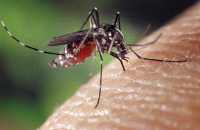
| July 2013 | |||||||||||
| Top stories | |||||||||||
| In the news | |||||||||||
| Photos | |||||||||||
| Contact us | |||||||||||
| Archive | |||||||||||
|
Lab confirms year's first case of West Nile virus in Linn County |
Iowa’s first human case of West Nile virus this year was confirmed in a patient from Linn County, according to a July 3 announcement by the Iowa Department of Public Health. The State Hygienic Laboratory conducted the confirmatory testing.

West Nile virus is usually transmitted to people by mosquitoes. Only one of five people who are infected with the virus will develop symptoms that may include fever, headache, body aches, joint pains, vomiting, diarrhea or rash. Usually, less than 1 percent of those infected develops serious neurologic illnesses, according to the CDC.
The incidence of West Nile virus in people, mosquitos, horses and chickens is tracked through a joint effort by the Hygienic Laboratory, the Iowa Department of Public Health, Iowa State University Department of Entomology, the Iowa Department of Agriculture and Land Stewardship, and several local health departments.
Local health departments collect mosquitoes and maintain sentinel chicken flocks across the state. Iowa State University Medical Entomology Department monitors the statewide levels of Culex pipiens and Culex tarsalis mosquitoes (the primary vectors of West Nile virus), and the State Hygienic Laboratory tests the mosquitoes to determine whether they are infected with West Nile virus or other arboviruses. The Hygienic Laboratory also tests the blood drawn from sentinel chickens weekly to determine whether they have been infected with West Nile virus or other arboviruses.
The chickens were placed in the counties in mid-June with the first blood specimens collected during the week of June 10. One sentinel chicken in Pottawattamie County has tested positive for West Nile virus.
West Nile virus activity in Iowa usually peaks in late summer and early fall. Since West Nile virus first appeared in Iowa in 2002, it has been found in every county in Iowa, either in humans, horses or birds. In 2012, there were 31 human cases of West Nile virus and no deaths.
The Iowa Department of Public Health said that the best way to prevent the virus is to eliminate mosquito breeding areas and to use insect repellent when outdoors. To reduce risk of exposure, the agency recommends that Iowans:
- Use insect repellent with DEET, picaridin, IR3535, or oil of lemon eucalyptus. Always read the repellent label and consult with a health care provider if you have questions when using these types of products on children. For example, DEET should not be used on infants less than 2 months old and oil of lemon eucalyptus should not be used on children under 3 years old.
- Avoid outdoor activities at dusk and dawn when mosquitoes are most active.
- Wear long-sleeved shirts, pants, shoes and socks whenever possible outdoors.
- Eliminate standing water around the home because that’s where mosquitoes lay eggs. Empty water from buckets, cans, pool covers and pet water dishes. Change water in bird baths every three to four days.